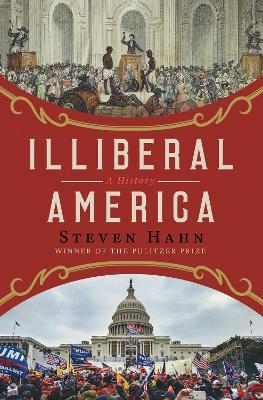
Illiberal America
A History
Seiten
2024
WW Norton & Co (Verlag)
978-0-393-63592-8 (ISBN)
WW Norton & Co (Verlag)
978-0-393-63592-8 (ISBN)
A leading historian reframes the American past by uncovering a powerful illiberalism as deep-seated and motivating as the founding ideals
A storm of illiberalism, building in the United States for years, unleashed its destructive force in the Capitol insurrection of 6 January 2021. The attack on American democracy and images of mob violence led many to recoil, thinking “That’s not us”. But Steven Hahn shows in his startling new history that illiberalism has deep roots in America's past. To those who believe that the ideals announced in the Declaration of Independence set the United States apart as a nation, Hahn shows that Americans have long been animated by competing values, equally deep-seated, in which the illiberal will of the community overrides individual rights and often protects itself by excluding perceived threats, whether on grounds of race, religion, gender, economic status or ideology.
Driven by popular movements and implemented through courts and legislation, illiberalism is part of the American bedrock. The United States was born a republic of loosely connected states and localities that demanded control of their domestic institutions, including slavery. As white settlement expanded west and immigration exploded in eastern cities, the democracy of the 1830s fuelled expulsions of Blacks, Native Americans, Catholics, Mormons and abolitionists. After the Civil War, southern states denied new constitutional guarantees of civil rights and enforced racial exclusions in everyday life. Illiberalism was modernised during the Progressive movement through advocates of eugenics who aimed to reduce the numbers of racial and ethnic minorities as well as the poor. The turmoil of the 1960s enabled George Wallace to tap local fears of unrest and build support outside the South, a politics adopted by Richard Nixon in 1968. Today, with illiberalism shaping elections and policy debates over guns, education and abortion, it is urgent to understand its long history and how that history bears on the present crisis.
A storm of illiberalism, building in the United States for years, unleashed its destructive force in the Capitol insurrection of 6 January 2021. The attack on American democracy and images of mob violence led many to recoil, thinking “That’s not us”. But Steven Hahn shows in his startling new history that illiberalism has deep roots in America's past. To those who believe that the ideals announced in the Declaration of Independence set the United States apart as a nation, Hahn shows that Americans have long been animated by competing values, equally deep-seated, in which the illiberal will of the community overrides individual rights and often protects itself by excluding perceived threats, whether on grounds of race, religion, gender, economic status or ideology.
Driven by popular movements and implemented through courts and legislation, illiberalism is part of the American bedrock. The United States was born a republic of loosely connected states and localities that demanded control of their domestic institutions, including slavery. As white settlement expanded west and immigration exploded in eastern cities, the democracy of the 1830s fuelled expulsions of Blacks, Native Americans, Catholics, Mormons and abolitionists. After the Civil War, southern states denied new constitutional guarantees of civil rights and enforced racial exclusions in everyday life. Illiberalism was modernised during the Progressive movement through advocates of eugenics who aimed to reduce the numbers of racial and ethnic minorities as well as the poor. The turmoil of the 1960s enabled George Wallace to tap local fears of unrest and build support outside the South, a politics adopted by Richard Nixon in 1968. Today, with illiberalism shaping elections and policy debates over guns, education and abortion, it is urgent to understand its long history and how that history bears on the present crisis.
Steven Hahn is an acclaimed historian whose works include A Nation Under Our Feet, winner of the Pulitzer Prize and the Bancroft Prize, and A Nation Without Borders. He is professor of history at New York University.
| Erscheinungsdatum | 05.03.2024 |
|---|---|
| Zusatzinfo | 8 pages of illustrations |
| Verlagsort | New York |
| Sprache | englisch |
| Maße | 160 x 239 mm |
| Gewicht | 739 g |
| Themenwelt | Sachbuch/Ratgeber ► Geschichte / Politik ► Regional- / Landesgeschichte |
| Geisteswissenschaften ► Geschichte ► Allgemeine Geschichte | |
| Geisteswissenschaften ► Geschichte ► Regional- / Ländergeschichte | |
| Sozialwissenschaften ► Politik / Verwaltung | |
| ISBN-10 | 0-393-63592-9 / 0393635929 |
| ISBN-13 | 978-0-393-63592-8 / 9780393635928 |
| Zustand | Neuware |
| Informationen gemäß Produktsicherheitsverordnung (GPSR) | |
| Haben Sie eine Frage zum Produkt? |
Mehr entdecken
aus dem Bereich
aus dem Bereich
von der osmanischen Eroberung bis zur Gründung des Staates Israel
Buch | Softcover (2023)
C.H.Beck (Verlag)
CHF 26,50
von der Staatsgründung bis zur Gegenwart
Buch | Softcover (2023)
C.H.Beck (Verlag)
CHF 16,80


